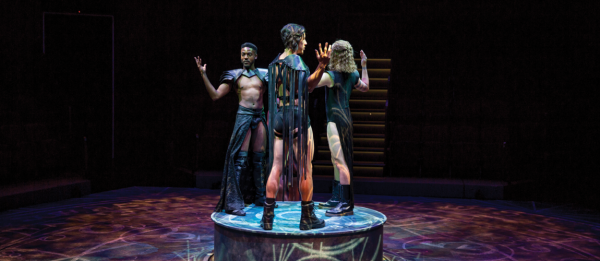“Everyone is Welcome and No One is Safe”: Robert O’Hara’s Macbeth Hits Denver

This month, the Denver Center kicks off their 2017-18 season with a bold, all-male production of Macbeth, directed by Robert O’Hara. A gay, black playwright and director based in New York City, O’Hara’s plays are daring and brilliant.
O’Hara sat down with OUT FRONT at the end of a tech rehearsal, sporting a tan cardigan, black Prada glasses, and a scruffy salt and pepper beard. After weeks in rehearsal, he was days away from the play’s debut.
This is your first time directing Shakespeare. What excited you about this project?
I’m not usually afforded the opportunity to direct Shakespeare—especially with these resources.
I wanted to do all men. I wanted to have it set through the witches’ perspectives. I wanted elements of rain, fire, and snow. I wanted a large cast. I wanted to make sure that I was able to be the artist that I am, rather than conform or make it polite. Because Macbeth is not polite.
It starts with three witches, and I wanted to make sure people understand that. Most directors will take the opening scene as if it’s the most normal thing on earth. They’re just talking to their neighbor, and I think, “No, these are witches.”
So the supernatural plays a big role in your take on Macbeth?
Macbeth was written under King James I and dedicated to him, and King James I wrote two books. One was about demons and witches and the other was the Bible. The supernatural and the spiritual were obviously big in this time period.
What I find fascinating about religion, the supernatural, and the spiritual is that we use it as an excuse for abhorrent behavior. That’s what happens in this play. Macbeth blames the witches. And most people who watch the play blame the witches.
When we want witches to heal us, give us herbs, make us feel better, make so-and-so stop messing with my man, we’re fine. But every other time, we want to burn them at the stake.
The witches are an important part of the play, but you’ve chosen to center the play from their perspective.
I am using the play as a ritual for the witches. Every generation, they get together and do the Scottish play that demonizes them.
There’s something also about honoring the dead in the play because the witches have been blamed for all of it.
This production is also the re-opening of the Space Theatre in Seattle. How was it to direct theater in the round?
All the plays I did in undergraduate were in the round, so it’s a little like coming home. It allows for the play to have a lightness of touch. You don’t have to wait for someone to get off stage before someone comes on stage. There are different levels and people all around you. You have to be constantly moving and constantly alive, which is exciting. It’s like directing a single-shot mini-series with no commercial breaks.
You can’t make a play where everyone sees the same thing, so it gives it a ritual quality: everyone is watching each other watch something. It embodies ritual.
Your previous plays have had a strong element of camp. How does that inform your directing of Shakespeare?
I don’t direct from a white, straight lens, so you can’t come in here and expect that sensibility. When people come into the theater and it doesn’t line up with their sensibility, they become frightened.
My motto for years has been “Everyone is welcome, and no one is safe.” I want you to feel uncomfortable because that’s how you know you’re alive. Otherwise, you could be eating a bar of chocolate in front of the TV.
I tell the cast, we’re building a bus, and people can get on the bus or get off the bus, but you can’t get on the bus and ask, “Can you slow down? I need to use the restroom.”
What does Macbeth have to offer us right now?
Well it’s about a ruthless, ego-maniacal would-be leader who steals the throne by killing, lying, and making up facts. I’ll let you take it from there.
Macbeth reaps what he sows in many ways. I think when you radicalize your constituency, they will turn on you in a radical way. Macbeth is usually killed by one person, but in our play he gets his comeuppance not only by the real but by the surreal. The play shows how ambition starts and where it can end, if you lead by ambition.
Macbeth runs Sept 21–Oct 29. The DCPA advises, “This highly-visual, all-male production sets Shakespeare’s plot and language in a ritualized world including stylized violence, minimal costuming (including exposed skin), some sexual content and pulsating music.”
What's Your Reaction?
Paul Bindel loves food preservation, poetry, and theatre. He lives in and writes from a housing cooperative in Capitol Hill.










